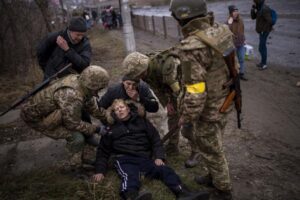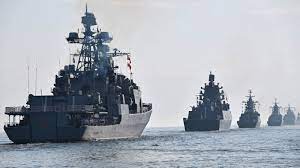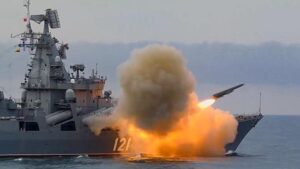As Ukraine Evacuates Trapped Seafarers, Foreign Mariners Count Cost of War
Bangladeshi seafarer Asiful Islam recalls the moment when a missile struck his cargo ship last week off the Ukrainian port of Olvia, killing his crew mate.
“I was just 15 feet away when it hit our ship. Our third engineer, Hadisur Rahman, who was killed, was standing just two feet away,” Islam told Reuters from Romania after the remaining crew members were evacuated over the weekend.

“All we could do was pray out loud. It was the worst night of my life. I had never been to war zone in my life.”
Many shipping firms have suspended sailings to affected Black Sea ports and other terminals in Ukraine. Insurance premiums for voyages have soared since Russia’s invasion on Feb. 24, an action Moscow calls a “special operation.”
Merchant shipping crew members of several nations are also among the 1.7 million people the United Nations says who have fled or been evacuated from Ukraine since the invasion.
Before the explosion on the night of March 2-3, Islam’s vessel, the Bangladesh-flagged Banglar Samriddhi, had been stuck in Olvia since Feb. 24 after Ukraine closed its ports.
Ukraine accused the Russian military of targeting the port facilities in a missile strike, while Russia’s embassy in Dhaka said last week the circumstances of the incident were “being established.” Russia denies deliberately targeting civilians.
Islam said the Olvia port authority reached the vessel with three tugboats and it took two hours to put out the fire.
“We were hiding in the control room (engine room) the whole night,” he said. “We heard air bombing many times a few kilometers away from our ship.”
Hours later, an Estonian-owned cargo ship sank off Ukraine’s Black Sea port of Odessa after an explosion. At least three other ships were hit by projectiles before those incidents.
The U.N. shipping agency will convene a special meeting this week to discuss the risks to seafarers and ships in the Black Sea and Sea of Azov as dangers to merchant shipping escalate.
NATO had warned civilian shipping to exercise caution and be on high alert in the area.
Ukraine’s navy said on Monday that their forces defending the Odessa region had hit a Russian vessel in the Black Sea with gunfire.
Ukraine’s Maritime Administration has said there are around 100 foreign flagged vessels with hundreds of seafarers still stuck in Ukrainian ports unable to sail or leave partly due to the fighting but also due to control of the waterways by Russia.
Viktor Vyshnov, deputy head of the administration, told Reuters efforts were under way to evacuate other foreign seafarers stuck in Ukrainian ports. In recent days up to 100 mariners had managed to reach neighboring Moldova from Ukraine before heading to their home nations, he said.
Vyshnov said the ability of authorities to evacuate more seafarers would depend on the situation in various port areas, adding that there was heavy fighting in Mykolaiv, with Mariupol further east encircled by Russia forces.
Greece’ foreign ministry said earlier on Monday that seafarers from the Philippines who worked for a Greek operated ship were among a group of 34 people evacuated from Odessa to Moldova on Monday, without providing further details.
In Bangladesh, Golam Mawla, 21, was hoping the body of his brother Hadisur Rahman, 28, would be repatriated after the strike on the Banglar Samriddhi.
Bangladeshi officials said they were still trying to get Rahman’s body back home.
“All our dreams are shattered. He was the sole breadwinner of our family,” Mawla said.
“My brother often called us from the ship but he never told us anything about the situation. He told us everything was fine so that we would not worry. But later we heard from his friends that he was really worried and wanted to leave Ukraine as soon as possible.”
BIMCO: Ukraine War Will Slow Growth, Hurting All Shipping
While much of the focus to date has been on the near-term impact to the tanker and bulker markets from Russia’s invasion of the Ukraine, shipowners’ association BIMCO is looking toward the wider analysis indicating that it sees the potential for sustained spill-over impacting the global economy and all sectors of the shipping industry. While saying that the full impact of the war is likely a ways off, BIMCO is looking at the impact on consumer confidence and the global economy pointing out despite longer-term contracts having already been set for 2022, that the war will likely lower growth prospects and be the factor to finally reduce demand after a year and a half surge in volumes related to the pandemic.

“The National Institute of Economic Research in the UK has estimated that the war could reduce global GDP growth by as much as one percentage point,” says Niels Rasmussen, Chief Shipping Analyst at BIMCO. “No matter the specific Russia and Ukraine export developments, this will hurt growth projections for all shipping sectors.”
Near-term the obvious impact has been on shipping from the Black Sea region, where Ukraine and Russia export a broad range of commodities. Rasmussen points out that the two countries combined hold a global market share of more than 10 percent within coal, wheat, and maize. Of particular concern to global supply, he says is the export of wheat and maize, which is mainly loaded in the Black Sea.
“It is difficult to imagine that what is left of Ukraine’s 2021 harvest will be shipped any time soon and, depending on developments, the 2022 harvest may also be hit,” says Rasmussen. “How much of Ukraine’s export can be replaced by export from other countries remains to be seen, but to the extent that it is possible it could lead to increased tonne miles demand.” While none of the commodities are currently sanctioned, BIMCO believes that the Black Sea exports are at a higher risk of seeing disruptions due to the lack of shipping companies’ willingness to serve the area and/or increasing shipping costs.
Further adding to the near-term concerns is the fact that Russia controls about 10 percent of all seaborne exports of both crude oil and refined products. BIMCO highlights that the majority of the oil products are exported from Black Sea ports, while Russia’s coal also comes from its Pacific ports.
While the energy products so far, despite pressures in the EU and U.S., are not included in the sanctions, BIMCO reports that European buyers appear to be shying away from Russian crude oil. “It is being reported that as much as 70 percent of crude exports do not have a buyer despite being heavily discounted,” says BIMCO while speculating that China could emerge as a buyer from Russian crude, which would help alleviate some of the current global supply concerns. The EU could buy more oil from the Middle East if China takes up the Russian supply.
“The global economy is already suffering from increased commodity prices,” writes Rasmussen. “Oil, wheat, and maize are trading at decade highs, at least. This will fuel further inflation that in many countries is already at its highest level in memory.” Consumers are likely among the first to react to the higher prices, with Rasmussen foreseeing destruction in demand as consumers and businesses respond to rising prices.
Some segments of shipping are likely to have a less direct impact from the closing of ports and sanctions. While many of the container lines decided to suspend bookings to and from Russia and Ukraine, BIMCO highlights that neither is a key market for the liners. They believe there will be a loss of volume for some reefer trades, but “Considering the very high global demand, the developments in the two countries should not be much of a concern for container rates or demand.”
All segments of the industry, however, are experiencing increased shipping costs due to historically high bunker prices that will only further add to the inflationary pressure. BIMCO believes OPEC + sticking to its already planned increases and crude oil price futures indicate that oil prices will remain above $100 per barrel likely to cause demand destruction while supply shortages may also hurt the shipping industry.
“The impact of the war on the global economy and consumer confidence,” BIMCO concludes, “may weaken growth prospects.” While saying that the impact is likely some way off, BIMCO sees a weakening of growth prospects combined with high prices which it believes could lead to an earlier “return to normal,” from the current elevated demand levels. They, however, see one positive, noting that the slowing growth could ease congestion in ports.
Report: Russian Patrol Ship Hit By Ukrainian Coastal Defenses
Ukraine’s military claims to have hit a Russian patrol ship with a shore-based rocket attack, marking the first reported casualty for a Russian Navy vessel since the start of the invasion in February. The vessel has been tentatively identified as the Vasily Bykov, the lead ship of the lightly-armed Project 22160 class of patrol vessels, and the extent of the damage is unknown.

Documented losses indicate that Ukrainian ground forces have destroyed or captured nearly 900 pieces of Russian military equipment since February 24, and analysts suggest that the true total may be substantially higher. The Ukrainian military’s Centre for Defence Strategies claims that the number exceeds 2,000. However, the Russian Navy has been largely exempt from these heavy losses: with the exception of an amphibious landing near Mariupol, it has had a standoff role in the conflict and has been little affected.
A video released by the Ukrainian military shows a volley of unguided multiple launch rockets (Grad MLRS) followed by a dim fire on the horizon and cheers from the defenders. The footage was taken at night, and the information about the attack is still preliminary, according to BlackSeaNews. If the reports are correct, the strike indicates a rare coastal defense application for a low-accuracy, Soviet-era Grad rocket launcher.
Russian warships have been loitering off the coast of Odesa since last week, and Ukrainian defense forces in the city have been on high alert for the possibility of an amphibious assault. As recently as Thursday, U.S. officials told Fox News that an amphibious landing was likely in or near Odesa.
However, on Sunday, a senior U.S. official told Reuters that the Pentagon no longer believes that such an attack is imminent. Russian ground forces have been repelled from the outskirts of Nikolaev (Mykolaiv), a small city to the east, and though they are regrouping, they are not expected to advance westward quickly. For now, any Russian amphibious landing at Odesa would be on its own – and given the limited capacity of the Russian tank landing ships in the Black Sea, the first wave would be greatly outnumbered by Ukrainian army and civil-defense forces.
Shell Plans To Withdraw From All Oil Projects In Russia
UK-Dutch petroleum giant, Shell on Tuesday. announced its intention to gradually withdraw from all oil and gas projects in Russia.
It said that it would stop all spot purchases of Russian oil as a first step.

“Shell today announced its intent to withdraw from its involvement in all Russian hydrocarbons, including crude oil, petroleum products, gas and liquefied natural gas (LNG) in a phased manner, aligned with new government guidance.
“As an immediate first step, the company will stop all spot purchases of Russian crude oil.
“ It will also shut its service stations, aviation fuels and lubricants operations in Russia,” the company said in a statement.
On Feb. 28, the energy giant said it had decided to withdraw from joint ventures with Gazprom and Gazprom Neft, including the Sakhalin 2 project, and to terminate its participation in the Nord Stream 2 gas pipeline project.
Kindly like us on Facebook















